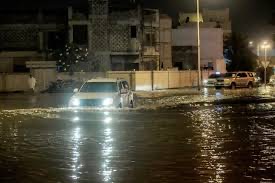- By Halimah Olamide
Heavy rain has been battering Gulf states, causing flash floods that have killed 20 people and disrupting flights at the world’s second-busiest airport.
Dubai Airport said it was facing “very challenging conditions” on Wednesday. It advised passengers not to turn up as runways were inundated with water.
Further north, a man died when his car was caught in flash floods.
In Oman, rescuers found the body of a girl in Saham, bringing the death toll in the country to 19 since Sunday.
Authorities also warned that more thunderstorms, heavy rain and strong winds were forecast, with many low-lying areas still under water.
More than 1,400 people have been evacuated to shelters. Schools and government offices have been closed as a precaution.
On Sunday, 10 schoolchildren aged between 10 and 15 and an adult were killed when their bus was swamped by floodwater as it attempted to drive through a wadi in the al-Mudhaibi area of Sharqiya province, about 115km (70 miles) south of the capital, Muscat.
Three other children and the driver were rescued. Two of them were reportedly airlifted to safety after being swept 600m (1,970ft) from the bus.
The sultanate’s council of ministers said it was “filled with grief” over the deaths and sent their condolences to the victims’ families.
As of Tuesday evening, two northern areas of Oman had received 180mm (7in) of rain since Sunday, while more than 120mm had fallen on eight other areas, the National Committee of Emergency Management said.
Precipitation is scarce in Oman. Annual average rainfall ranges from 150 to 300mm in the north, with most falling in pre- and post-monsoon storms.
Footage from the centre of Dubai, meanwhile, showed dozens of submerged vehicles on a flooded part of Sheikh Zayed Road, as well as long traffic jams elsewhere on the 12-lane highway.
No deaths were reported in Dubai, but an elderly man was killed when his vehicle was swept away in a flash flood in Ras al-Khaimah.
Although the rain had eased by Tuesday evening, Dubai International Airport warned on Wednesday morning that “recovery will take some time”.
“We are currently experiencing significant disruption due to the weather and are continuously working with our emergency response teams and service partners to restore normal operations as quickly as possible,” it said on X, formerly Twitter.
“Flooding and road blockages have left limited transport options for arriving and departing guests. Flights are delayed/diverted and impacted by displaced crew,” it added.
Emirates, one of the UAE’s two flag carriers and the world’s largest international airline, meanwhile told customers that check-in had been suspended at the airport for all flights until midnight (20:00 GMT).
FlyDubai, Emirates’ low-cost sister airline, said some outbound flights would operate from one terminal after 20:00.
Its chief executive, Paul Griffiths, told local radio station Dubai Eye: “In living memory, I don’t think anyone has ever seen conditions like it.”
The UAE government advised people to stay at home and extended remote working for its employees. Private schools were also advised to carry out remote learning.
The heavy rain also hit Saudi Arabia and Bahrain, where videos showed cars stranded in flooded roads.
Many factors contribute to flooding, but a warming atmosphere caused by climate change makes extreme rainfall more likely.
The world has already warmed by about 1.1C since the industrial era began and temperatures will keep rising unless governments around the world make steep cuts to emissions.
BBC


